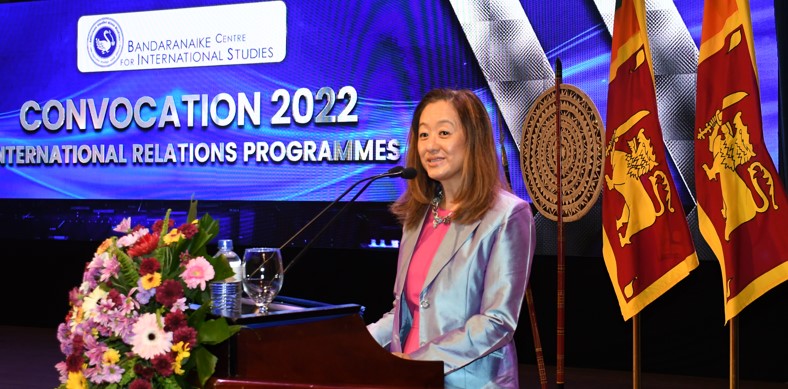By P.K.Balachandran
Colombo, August 20: The US Ambassador to Sri Lanka Julie Chung is confident that Sri Lanka will recover from its present political and economic troubles, but she cautions that it will have to ensure political stability and take hard decisions in consonance with the IMF’s stipulations to bring about the desired result.
Addressing the annual convocation of the Bandaranaike Centre for International Studies (BCIS) here on Saturday, Ambassador Chung warned that there is no magic wand to bring about change and that the Lankan government will have to take unpopular decisions.
Ambassador Chung gave the students some tips about how to look at issues facing them. In the process she subtly conveyed that that her recipe would be applicable to nations too.
She said that no problem will be difficult if it is tackled by all concerned together. “It is easy to stop and hide from the problem. But that kind of approach will lead you nowhere. Take that one small step forward.”
In an apparent reference to a tendency to isolate oneself or one’s country from the rest of the world, Chung said that it is important to realize that the world and humanity everywhere are inter-connected and what happens around us or in one part of the world, affects all. World events are not a “spectator sport” to be watched and not get involved, she said.
She told the recipients of diplomas and certificates that they should not shy away from change or fight change, but embrace it. The other key aspect of life and the human environment is communication. Bad communication could lead to misunderstandings. One should guard against disinformation and fake rhetoric. Before communicating anything the sources of the information must be checked to ascertain its veracity. Information is a moving target. One should not jump to conclusions about it but give it time to develop.
It is important to have convictions and convictions are about what one believes at the core of oneself. And one should stay true to oneself. In the modern world, convictions should be about equality, justice, democracy and non-discrimination. “Discrimination may be dangerous,” Chung warned.
The Ambassador spoke about the need to be positive. “Say yes when you can. Say yes far more than you would say no.” And then be true to your word, she added.
Planning one’s moves is essential Chung said. “Plans should be strategic in thinking but realistic in implementation,” she said. Referring to the Russian invasion of Ukraine she pointed out that the Russians had not been realistic and that is why their plans had gone awry. They got in but are unable to figure out how to get out of the sticky situation.
In an apparent reference to Sri Lanka’s ties with China, Chung said, without mentioning any party, that one should choose one’s alliances carefully. There could be mismatches whether in marital relations or any other relationships.
The Senior Director of the BCIS, Ambassador Sumith Nakandala, said that the BCIS had distinguished itself by not ceasing its academic activities during the pandemic. The virtual mode was used to continue its work.
One of the products of the pandemic was the realization of the need for global cooperation in every field of activity, Nakandala said. As far as Sri Lanka is concerned its present problems were triggered by the pandemic but they were in the making much before, due to long-standing political and economic mismanagement, he added.
The BCIS trains students for the Postgraduate Diploma, Higher Diploma, Diploma and Certificate in International Relations. It was founded in 1974 by Prime Minister Sirimavo Bandaranaike. It is the pioneering institution in the field of International Relations. It also offers Postgraduate programs in International Relations to graduates from recognized universities in Sri Lanka and abroad, besides carrying out research. In addition, an array of international languages are taught.
END











.jpg&h=630&w=1200&q=100&v=5f99a4b43f&c=1)









Discussion about this post